Related Research Articles

Philip Kindred Dick, often referred to by his initials PKD, was an American science fiction writer and novelist. He wrote 44 novels and about 121 short stories, most of which appeared in science fiction magazines during his lifetime. His fiction explored varied philosophical and social questions such as the nature of reality, perception, human nature, and identity, and commonly featured characters struggling against elements such as alternate realities, illusory environments, monopolistic corporations, drug abuse, authoritarian governments, and altered states of consciousness. He is considered one of the most important figures in 20th-century science fiction.
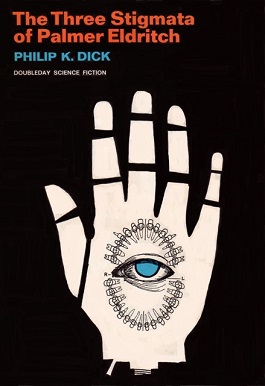
The Three Stigmata of Palmer Eldritch is a 1964 science fiction novel by American writer Philip K. Dick. It was nominated for the Nebula Award for Best Novel in 1965. Like many of Dick's novels, it utilizes an array of science fiction concepts and explores the ambiguous slippage between reality and unreality. It is one of Dick's first works to explore religious themes.

Do Androids Dream of Electric Sheep? is a 1968 dystopian science fiction novel by American writer Philip K. Dick. It is set in a post-apocalyptic San Francisco, where Earth's life has been greatly damaged by a nuclear global war, leaving most animal species endangered or extinct. The main plot follows Rick Deckard, a bounty hunter who has to "retire" six escaped Nexus-6 model androids, while a secondary plot follows John Isidore, a man of sub-par IQ who aids the fugitive androids.
"Second Variety" is a science fiction novelette by American writer Philip K. Dick, first published in Space Science Fiction magazine, in May 1953. Set in a world where war between the Soviet Union and United Nations has reduced most of the world to a barren wasteland, the story concerns the discovery, by the few remaining soldiers left, that self-replicating robots originally built to assassinate Soviet agents have gained sentience and are now plotting against both sides. It is one of many stories by Dick examining the implications of nuclear war, particularly after it has destroyed much or all of the planet.

The Berserker series is a series of space opera science fiction short stories and novels by Fred Saberhagen, in which robotic self-replicating machines strive to destroy all life.
"The Variable Man" is a science fiction novella by American writer Philip K. Dick, which he wrote and sold before he had an agent. It was first published in the British magazine Space Science Fiction Vol. 2 No. 2, July 1953, and in the American version in September 1953, with the US publication illustrated by Alex Ebel. Despite the magazine cover dates it is unclear whether the first publication was in the UK or in the United States where magazines tended to be published farther ahead of their cover dates than in the UK. The Variable Man can be found in several collections of Dick's short stories, including The Variable Man and The Short Happy Life of the Brown Oxford.

The Time Ships is a 1995 hard science fiction novel by Stephen Baxter. A canonical sequel to the 1895 novella The Time Machine by H. G. Wells, it was officially authorized by the Wells estate to mark the centenary of the original's publication. The Time Ships won critical acclaim. It won the John W. Campbell Memorial Award and the Philip K. Dick Award in 1996, as well as the British Science Fiction Association Award in 1995. It was also nominated for the Hugo, Clarke and Locus Awards in 1996.

The Divine Invasion is a 1981 science fantasy novel by American writer Philip K. Dick. It is the second book in the gnostic VALIS trilogy, and takes place in the indeterminate future, perhaps a century or more after VALIS. The novel, originally titled Valis Regained, was nominated to the BSFA Award.
"The Last of the Masters" is a science fiction novelette by American writer Philip K. Dick. The original manuscript of the story was received by the Scott Meredith Literary Agency on July 15, 1953, and the story was published by the Hanro Corporation in the final issue of Orbit Science Fiction in 1954. It has since been reprinted in several Philip K. Dick story collections, beginning with The Golden Man in 1980.
"Sales Pitch" is a science fiction short story by American writer Philip K. Dick, first published in Future Science Fiction magazine, June 1954. The premise is the omnipresent, intrusive and even aggressive advertising and marketing. At the end of the story, the protagonist is driven mad by a robot who can forcefully market himself, and refuses to take no for an answer. The subject was of concern to Dick, and features in his early works such as The Man Who Japed.
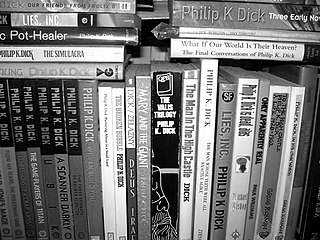
The bibliography of Philip K. Dick includes 44 novels, 121 short stories, and 14 short story collections published by American science fiction author Philip K. Dick during his lifetime.
"Impostor" is a science fiction short story by American writer Philip K. Dick. It was first published in Astounding SF magazine, 3 June 1953.

"Planet for Transients" is a 1953 science fiction short story by American writer Philip K. Dick. The story was originally published in the October–November 1953 issue of Fantastic Universe. The story also appears in We Can Remember It for You Wholesale . The author's original title for the story was "The Itinerants".

The Collected Stories of Philip K. Dick is a collection of 118 science fiction stories by American writer Philip K. Dick. It was first published by Underwood-Miller in 1987 as a five volume set. See Philip K. Dick bibliography for information about the mass market reprints.
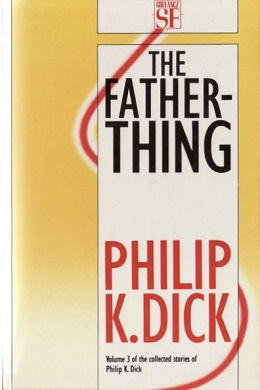
The Father-Thing is a collection of science fiction stories by American writer Philip K. Dick. It was first published by Gollancz in 1989 and reprints Volume III of The Collected Stories of Philip K. Dick. It had not previously been published as a stand-alone volume. Many of the stories had originally appeared in the magazines If, Science Fiction Adventures, Science Fiction Stories, Orbit, Fantasy and Science Fiction, Imagination, Future, Galaxy Science Fiction, Beyond Fantasy Fiction, Satellite, Science Fiction Quarterly and Imaginative Tales.
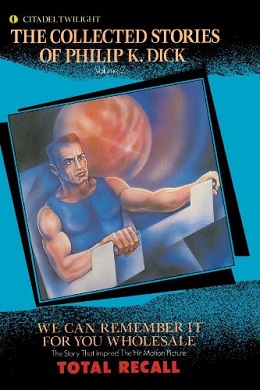
We Can Remember It for You Wholesale is a collection of science fiction stories by American writer Philip K. Dick. It was first published by Citadel Twilight in 1990 and reprints Volume II of The Collected Stories of Philip K. Dick replacing the story "Second Variety" with "We Can Remember It for You Wholesale". Many of the stories had originally appeared in the magazines Fantasy Fiction, Fantastic Universe, Fantasy and Science Fiction, Imagination, If, Amazing Stories, Science Fiction Quarterly, Startling Stories, Cosmos, Orbit, Astounding, and Planet Stories.
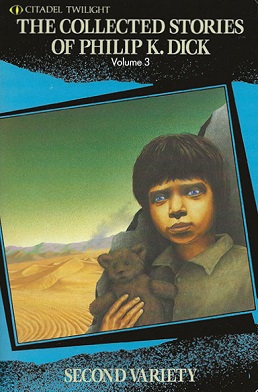
Second Variety is a collection of science fiction stories by American writer Philip K. Dick. It was first published by Citadel Twilight in 1991 and reprints Volume III of The Collected Stories of Philip K. Dick with the addition of the story "Second Variety". Many of the stories had originally appeared in the magazines If, Science Fiction Adventures, Science Fiction Stories, Orbit, Fantasy and Science Fiction, Imagination, Future, Galaxy Science Fiction, Beyond Fantasy Fiction, Satellite, Science Fiction Quarterly, Imaginative Tales and Space Science Fiction. There is huge overlap with the 1997 The Philip K. Dick Reader: stories 1–20 and 24 are identical.

The Philip K. Dick Reader is a collection of science fiction stories by American writer Philip K. Dick. It was first published by Citadel Twilight in 1997. Many of the stories had originally appeared in the magazines If, Science Fiction Adventures, Science Fiction Stories, Orbit, Fantasy and Science Fiction, Imagination, Future, Galaxy Science Fiction, Beyond Fantasy Fiction, Satellite, Imaginative Tales, Fantastic Universe and Space Science Fiction. It is identical in content and order to the edition of volume 3 of the Collected Stories of Philip K. Dick produced by the same publisher apart from the substitution of three stories in positions 21-23 of 24 and the omission of the end notes in the Collected Stories edition. At press time, stories 21 and 24 had already been made into successful movie adaptations and stories 22 and 23 had been optioned.
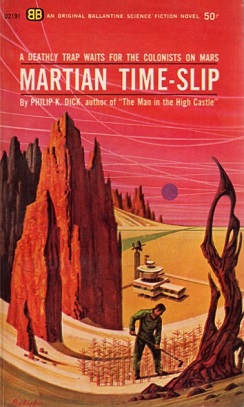
Martian Time-Slip is a 1964 science fiction novel by American writer Philip K. Dick. The novel uses the common science fiction concept of a human colony on Mars. However, it also includes the themes of mental illness, the physics of time and the dangers of centralized authority.
"Prize Ship" is a science fiction short story by American writer Philip K. Dick. It was first published in 1954 in Thrilling Wonder Stories and later in The Collected Stories of Philip K. Dick, Volume One: Beyond Lies The Wub and later trade editions of the collected stories.
References
- ↑ Sandner, David; Palumbo, Donald E.; Sullivan III, C. W. (2020-03-10). Philip K. Dick: Essays of the Here and Now. McFarland. p. 74. ISBN 978-1-4766-3919-2.
- ↑ Gessert, George (1 January 1996). "The Angel of Extinction". Northwest Review. 34 (3). University of Oregon: 115. ProQuest 1299906235.